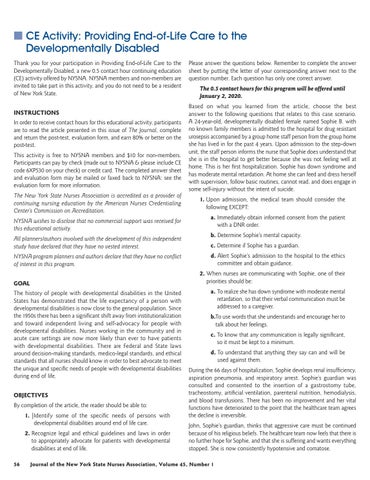■ CE Activity: Providing End-of-Life Care to the Developmentally Disabled
Thank you for your participation in Providing End-of-Life Care to the Developmentally Disabled, a new 0.5 contact hour continuing education (CE) activity offered by NYSNA. NYSNA members and non-members are invited to take part in this activity, and you do not need to be a resident of New York State. INSTRUCTIONS In order to receive contact hours for this educational activity, participants are to read the article presented in this issue of The Journal, complete and return the post-test, evaluation form, and earn 80% or better on the post-test. This activity is free to NYSNA members and $10 for non-members. Participants can pay by check (made out to NYSNA & please include CE code 6XP530 on your check) or credit card. The completed answer sheet and evaluation form may be mailed or faxed back to NYSNA; see the evaluation form for more information. The New York State Nurses Association is accredited as a provider of continuing nursing education by the American Nurses Credentialing Center’s Commission on Accreditation. NYSNA wishes to disclose that no commercial support was received for this educational activity. All planners/authors involved with the development of this independent study have declared that they have no vested interest. NYSNA program planners and authors declare that they have no conflict of interest in this program.
The 0.5 contact hours for this program will be offered until January 2, 2020. Based on what you learned from the article, choose the best answer to the following questions that relates to this case scenario. A 24-year-old, developmentally disabled female named Sophie B. with no known family members is admitted to the hospital for drug resistant urosepsis accompanied by a group home staff person from the group home she has lived in for the past 4 years. Upon admission to the step-down unit, the staff person informs the nurse that Sophie does understand that she is in the hospital to get better because she was not feeling well at home. This is her first hospitalization. Sophie has down syndrome and has moderate mental retardation. At home she can feed and dress herself with supervision, follow basic routines, cannot read, and does engage in some self-injury without the intent of suicide. 1. Upon admission, the medical team should consider the following EXCEPT: a. Immediately obtain informed consent from the patient with a DNR order. b. Determine Sophie’s mental capacity. c. Determine if Sophie has a guardian. d. Alert Sophie’s admission to the hospital to the ethics committee and obtain guidance. 2. When nurses are communicating with Sophie, one of their priorities should be:
GOAL The history of people with developmental disabilities in the United States has demonstrated that the life expectancy of a person with developmental disabilities is now close to the general population. Since the 1950s there has been a significant shift away from institutionalization and toward independent living and self-advocacy for people with developmental disabilities. Nurses working in the community and in acute care settings are now more likely than ever to have patients with developmental disabilities. There are Federal and State laws around decision-making standards, medico-legal standards, and ethical standards that all nurses should know in order to best advocate to meet the unique and specific needs of people with developmental disabilities during end of life. OBJECTIVES By completion of the article, the reader should be able to: 1. |Identify some of the specific needs of persons with developmental disabilities around end of life care. 2. Recognize legal and ethical guidelines and laws in order to appropriately advocate for patients with developmental disabilities at end of life. 56
Please answer the questions below. Remember to complete the answer sheet by putting the letter of your corresponding answer next to the question number. Each question has only one correct answer.
a. To realize she has down syndrome with moderate mental retardation, so that their verbal communication must be addressed to a caregiver. b.To use words that she understands and encourage her to talk about her feelings. c. To know that any communication is legally significant, so it must be kept to a minimum. d. To understand that anything they say can and will be used against them. During the 66 days of hospitalization, Sophie develops renal insufficiency, aspiration pneumonia, and respiratory arrest. Sophie’s guardian was consulted and consented to the insertion of a gastrostomy tube, tracheostomy, artificial ventilation, parenteral nutrition, hemodialysis, and blood transfusions. There has been no improvement and her vital functions have deteriorated to the point that the healthcare team agrees the decline is irreversible. John, Sophie’s guardian, thinks that aggressive care must be continued because of his religious beliefs. The healthcare team now feels that there is no further hope for Sophie, and that she is suffering and wants everything stopped. She is now consistently hypotensive and comatose.
Journal of the New York State Nurses Association, Volume 45, Number 1



